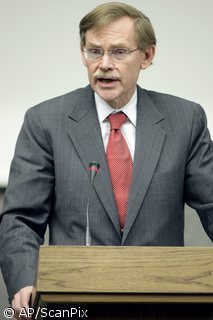The euro zone continues to experience a jobless recovery, with no indication that new jobs are being created after more than a year of generally sluggish economic growth
Published:
4 September 2004 y., Saturday
According to figures published Wednesday by the European Union statistics agency, the unemployment rate in the dozen countries using the euro was unchanged at 9 percent in July.
The figures were in line with expectations, and remain far above other parts of the industrialized world. The jobless rate stood at 5.6 percent in the United States and 4.9 percent in Japan, according to Eurostat.
Unlike other developed economies, the euro zone has yet to experience a burst of job creation in response to stronger global economic growth, and there is little sign of dramatic improvement this year. The high unemployment rate partly explains the weak state of consumer confidence in the euro zone and the low level of spending growth.
According to a survey of euro-zone purchasing managers also published Wednesday, manufacturers cut payrolls for the 39th straight month in August, and at a faster rate than in July.
Unemployment rates varied widely across the currency area, with Austria recording a jobless rate of 4.2 percent, while Spain recorded a jobless rate of 11 percent.
In the European Union as a whole — which includes Britain, Sweden, Denmark and the 10 mostly central and eastern European countries that joined the area May 1 — the jobless rate fell to 9 percent from 9.1 percent in June.
Šaltinis:
story.news.yahoo.com
Copying, publishing, announcing any information from the News.lt portal without written permission of News.lt editorial office is prohibited.
The most popular articles
 An International Monetary Fund (IMF) mission led by Mr. Hunter Monroe of the IMF’s Western Hemisphere Department visited Dominica during January 18-28 for the annual Article IV discussions on economic developments and macroeconomic policies.
more »
An International Monetary Fund (IMF) mission led by Mr. Hunter Monroe of the IMF’s Western Hemisphere Department visited Dominica during January 18-28 for the annual Article IV discussions on economic developments and macroeconomic policies.
more »
 Experts in agriculture and government authorities coincided in requesting new management mechanisms and market regulation to protect the farming sector from the price crisis and enable generational changeover in rural areas at the European Congress of Young Farmers, organised by the ASAJA-Seville agricultural organisation.
more »
Experts in agriculture and government authorities coincided in requesting new management mechanisms and market regulation to protect the farming sector from the price crisis and enable generational changeover in rural areas at the European Congress of Young Farmers, organised by the ASAJA-Seville agricultural organisation.
more »
 Immediate action is required to solve Europe's skills deficiencies and give Europeans a better chance of labour market success in the future, says an independent expert report published by the European Commission today.
more »
Immediate action is required to solve Europe's skills deficiencies and give Europeans a better chance of labour market success in the future, says an independent expert report published by the European Commission today.
more »
 The European Investment Bank (EIB) is lending EUR 15.5 million to upgrade water supply and wastewater treatment in the City of Mykolayiv (southern Ukraine) and EUR 100 million to finance small and medium-sized investments in the areas of SMEs, energy efficiency and the environment in Ukraine.
more »
The European Investment Bank (EIB) is lending EUR 15.5 million to upgrade water supply and wastewater treatment in the City of Mykolayiv (southern Ukraine) and EUR 100 million to finance small and medium-sized investments in the areas of SMEs, energy efficiency and the environment in Ukraine.
more »
 The European Commission can confirm that on 20 January 2010 Commission officials carried out targeted inspections at the premises of producers of Flexible Alternating Current Transmission Systems (FACTS).
more »
The European Commission can confirm that on 20 January 2010 Commission officials carried out targeted inspections at the premises of producers of Flexible Alternating Current Transmission Systems (FACTS).
more »
 The European Commission has authorised today under the State aid rules a Lithuanian scheme worth LTL 10 million (approximately EUR 2.9 million) aimed at supporting farmers who encounter difficulties as a result of the current economic crisis.
more »
The European Commission has authorised today under the State aid rules a Lithuanian scheme worth LTL 10 million (approximately EUR 2.9 million) aimed at supporting farmers who encounter difficulties as a result of the current economic crisis.
more »
 The effects of the global food, fuel and economic crisis would be felt by Africa’s people for some time yet and it was important to persist with efforts to protect the most vulnerable while laying the foundations for future productivity and growth, World Bank Group President Robert B. Zoellick said Tuesday.
more »
The effects of the global food, fuel and economic crisis would be felt by Africa’s people for some time yet and it was important to persist with efforts to protect the most vulnerable while laying the foundations for future productivity and growth, World Bank Group President Robert B. Zoellick said Tuesday.
more »
 Mongolia’s herders have learnt a hard lesson this winter; a lesson that can perhaps be applied to managing Mongolia’s economy.
more »
Mongolia’s herders have learnt a hard lesson this winter; a lesson that can perhaps be applied to managing Mongolia’s economy.
more »
 DnB NORD Bankas, the leader of the country’s in investment products market, raises initial margin ratio for repurchase deals for most actively traded Lithuanian and Estionian shares.
more »
DnB NORD Bankas, the leader of the country’s in investment products market, raises initial margin ratio for repurchase deals for most actively traded Lithuanian and Estionian shares.
more »
 With over 23 million unemployed in the Europe Union and the jobless figure having risen in every member state since last year, how Europe is coping with the crisis and the effect on pension systems were discussed on Thursday 28 January.
more »
With over 23 million unemployed in the Europe Union and the jobless figure having risen in every member state since last year, how Europe is coping with the crisis and the effect on pension systems were discussed on Thursday 28 January.
more »